Investor's note
On Deck alumnae Melissa Kargiannakis and Carolyne Pelletier, co-founders of skritswap, did not meet by chance. They each followed specific processes to find the co-founders they were looking for.
For Melissa, the goal was to find a technical co-founder & CTO with significant NLP chops. Carolyne, on the other hand, was looking for a partner who would be a business leader solving an interesting-enough problem (worth foregoing that high FAANG machine learning pay).
Their partnership so far has been an exemplary match. 8 months in, skritswap is paving the way to simplify legal documents into plain and clear language. They’ve done so by building novel datasets in the contracts domain using patent-pending heuristics (skritswap's clarity score) with the help of expert data annotators. With these datasets, the tech team, led by Carolyne, have taught NLP models to simplify contracts, which are soon to be deployed via an API. They’ve also expanded into helping companies with text data solve core business problems using NLP / ML (Natural Language Processing / Machine Learning).
But how did Melissa and Carolyne find each other?
Step one was joining a high-quality founder community by participating in the On Deck Founder Fellowship. Each ODF cohort onboards 150 fellows, and there are 5-6 new cohorts brought on a year — which means that Melissa and Carolyne were selected from a pool of founders growing at 750 a year. Among these, many are looking for technical co-founders and CTO, which can lead to a dizzying number of meetings and potential co-founder matches.
We asked Melissa and Carolyne to share their playbooks on how to successfully find a co-founder fit through ODF — especially among what can feel like an overwhelming number of options.
Melissa’s playbook covers topics such as:
- Why you should anchor your co-founder searching approach and simplify your messaging
- How to build a technical co-founder pipeline
- How to evaluate your technical co-founder candidates
Carolyne’s playbook, on the other hand, focuses on:
- How to signal to your network that you are interested in startups
- How to evaluate your co-founder candidates
- How to assess the existing startup for fit
Melissa’s Playbook: Finding a Technical Co-Founder through ODF
Set the right foundations and anchor your approach
Before you begin your search for a co-founder & CTO through On Deck (ODF) you need to acknowledge that they’ll probably be what I call “On Deck-Adjacent”.
Most people who join ODF typically already have an idea of what they want to do/build. If you try to convince a fellow who is already fired up about their own idea to leave it behind and help you work on yours — you’ll probably fail, or be left playing a values alignment game to see if your ideas are similar enough to be combined into one.
So here’s the first step on my playbook: instead of looking for a co-founder & CTO within your ODF cohort, see if another On Deck Fellow can introduce you to someone outside the Fellowship who would be a good fit to become your co-founder & CTO.
First, leveraging the ODF community’s connections will guarantee you reach many more potential co-founders than if you simply looked within your cohort. Second, these people most likely won’t have a startup idea they’re adamant about, which means it’ll be much easier to convince them to quit their jobs and join you.
This mentality, that of seeking co-founders beyond your ODF cohort, should anchor your co-founder search approach. But before you can ask your fellow ODFers to introduce you to their engineer friends, you first need to earn their trust and let them know exactly what you’re looking for. To accomplish this, I advise you to simplify your messaging as much as you can.
Become known for one thing
If you want to maximize your chances of finding a co-founder, you need to make as many connections with your fellow ODFers as possible. But building connections takes time, and there’s just not enough hours in the day to talk to every single Fellow.
Before you start randomly reaching out to people, make it known who you are, how you can help, and what you’re looking for. Keep in mind that the sheer number of people involved in any given ODF cohort can make it hard to stand out. One way to bypass this issue is to become known for:
- One thing you can offer to the community
- One thing you are looking for
Let me explain: when I joined ODF, I made it a point to repeat to every Fellow I met, over and over again, that I was:
- GIVING fundraising advice and strategy support for angel / pre-seed rounds
- LOOKING FOR a co-founder & CTO for an NLP-focused AI start-up
My message was so simple it allowed folks to easily categorize me, which in turn made me stand out. I repeated this message so many times, and to so many people, that after a certain point anytime anyone thought about either fundraising advice or NLP-focused AI start-ups, they thought of me.
Now that you know you probably won’t find your co-founder in ODF, but through On Deck Fellows’ friends, and that you need to simplify your messaging to stand out and force serendipity — it’s time to begin the process of finding your co-founder. I recommend you do two things:
- Build a Pipeline of Potential Co-Founders
- Evaluate Your Candidates
Below, I’ll detail both.
Build a Pipeline of Potential Co-Founders
Recruiting is much like sales or fundraising in the sense that to close sales, get investment or hire top talent, you need to do loads of outbound outreach.
But onbound outreach is a complex process, especially when sourcing for positions as potentially impactful as that of a technical co-founder. To succeed, you need to be intentional and action-oriented. You need a strong process, clear goals, and timelines you can stick to.
When I say “strong process”, what I mean is that you need to build a multi-step funnel you can work through. Finding a co-founder & CTO is the end goal, but it’s a distant one. Setting mini goals along the way will help keep you focused and moving through your process. To give an example, I set goals about how many LinkedIn messages I sent every day and about how many people I followed up with.
But incremental goals aren’t enough. You also need to time-bind your process to ensure you keep up momentum and actually achieve those goals.
Start-ups are all about how much you can do and how quickly you can do it. I often use calendar holds a few weeks in advance when I know I need to do certain things. For example, I knew it would take 2-3 weeks going through the funnel to line up interviews with approx. 20 candidates. I put 20 holds in my calendar during those weeks so that when I was scheduling I could simply offer candidates the times at Hold 3 or Hold 15, which gave me predictability in my schedule and held me accountable to my goals.
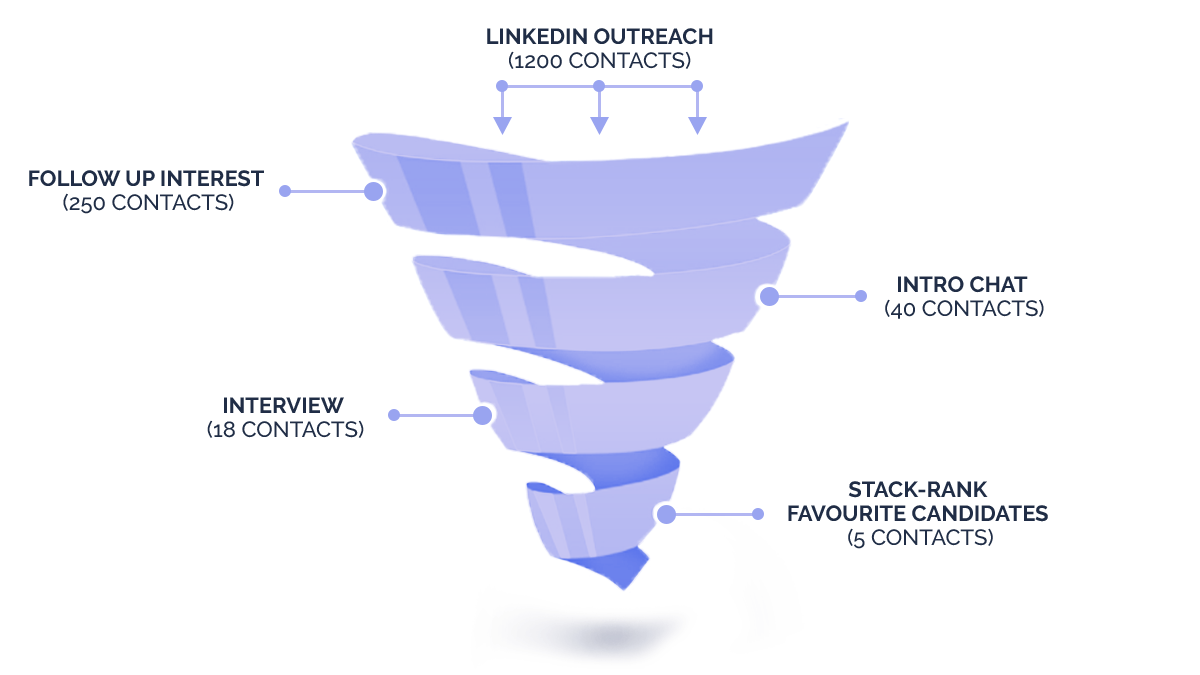
But what did my outreach pipeline look like? First, I connected with every single ODF fellow from the first five cohorts on LinkedIn with the following message:
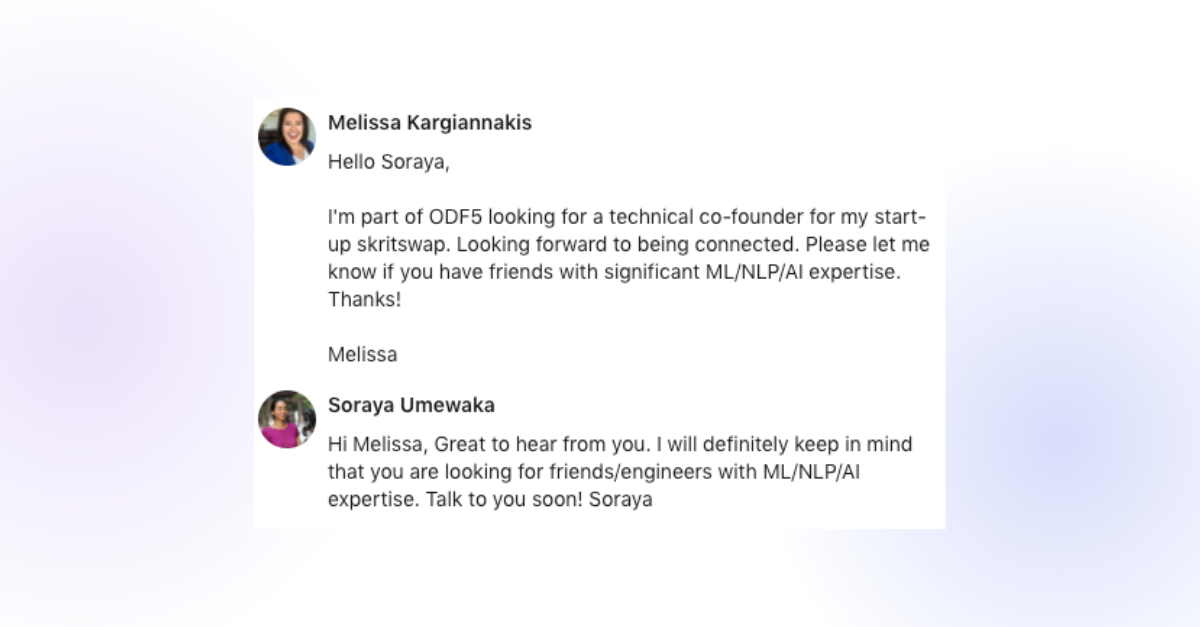
When folks replied to me, I sent a follow-up message with more specific information about who/what I was looking for (~250 people). Some folks never replied and only accepted the connection request so they never saw this message:
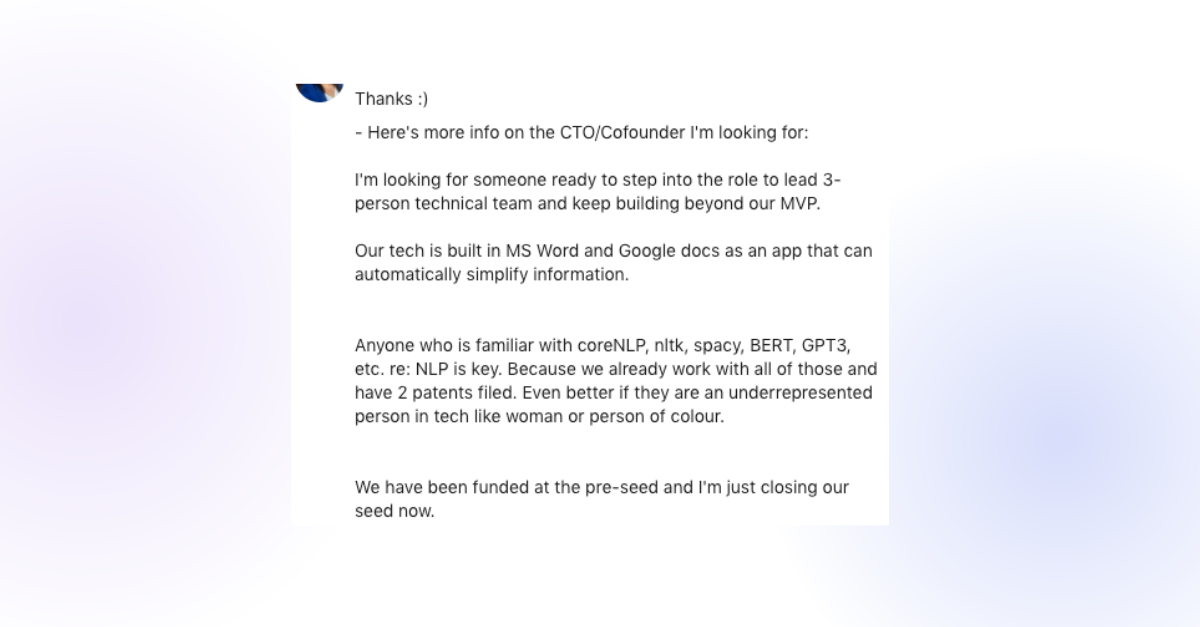
After direct messages I began to do introductory calls with potential candidates. I focused first on sharing the history and mission of the company because we were in the unusual position of already pre-seed funded, with paying customers, and a growing team at the time I chose to recruit a co-founder & CTO.
I ended up having 40 introductory calls. During each call, I determined each candidate’s interest in the company, and if their values aligned with mine (and the rest of my team). That rubric cut the number of viable candidates by more than half. From these calls, 18 candidates shared a strong enough connection with me in terms of values, vision, and complementary skills to go through a second longer, more formal interview.
Candidates’ skill sets and work experience are just as important as how they see the world and make decisions. During this second interview, I evaluated the candidate’s long-term career goals for start-up fit, their personal missions and values, and past experience, by asking a mix of behavioural and experiential questions.
Behavioural Question Examples:
- Tell me about a time when you were behind schedule on shipping a product with your team. How did you handle the situation and what was the outcome?
- Talk to me about the last MVP you built? Did it progress to full production? What was that process like?
- In the tech teams you’ve led in the past, have you ever made a bad hire? When did you realize it? How did you handle it?
Experiential Question Examples:
- How do you keep your tech skills up to date?
- What online resources / communities do you leverage to do your work?
- How do you think future technology advances will impact your job, not just as a developer, but also as a CTO managing other developers?
Once you have values alignment, and you see a strong potential future together, it’s time to put your potential co-founder & CTO candidates’ skills to the test.
Evaluating your Technical Co-founder Candidates
How you approach your potential co-founder evaluation will depend on your level of technical knowledge—but here’s some general advice to navigate this part of the process. To begin with, and particularly if your technical knowledge is lacking...
Lean on your Technical Network
If you are not a technical founder, you will have to lean on your network of technical people to evaluate your co-founder & CTO candidates.
On Deck is a great place to do this. I am non-technical so I had to reach out to investors, advisors, and other On Deck Fellows to get help. Some offered great questions, others provided short tests, and some even interviewed the final five candidates for a third and last time.
Put their Tech Skills to the Test
You’ll never get a full sense of their technical skills until they are put to the test. If possible, create situations where this can happen. Assuming NDAs have been signed, let them in on your tech stack and ask them what they think, what they would improve, and what they see for the future.
Carolyne quickly understood the tech stack (which was also a testament to the current tech team who spent time with her explaining it), worked on a small feature improvement, and was able to explain how recent NLP models can bring our tech to the next level. This exercise had the dual advantage of allowing the tech team to evaluate Carolyne.
If you don’t have anything built yet, ask your technical co-founder candidates how they would build it, and why? Get them to justify their answers and pay attention to the language and patience they deploy. While you may not understand the ins-and-outs of what they are talking about, they should be able to explain it to you in a simple way, just like they would in an investment meeting. When it comes to the CTO role for any company looking to scale, technical knowledge is as critical as their ability to communicate it to non-technical people.
Figure out if they are fit for life in an early-stage startup
Technical co-founders may be juggling several opportunities coming from later-stage startups or industry positions, with work-lives (and paychecks!) opposite to that of working at early-stage startups. Before you ask them to join your team, you need to verify they know what they’re getting into, and sense whether they are ready.
Some questions to guide your intuition on whether they are the right fit for life at an early-stage startup:
1.Do they optimize their career for money today? If they are willing to take more equity or less salary, that’s a good sign. Industry jobs pay the big bucks, so if they do optimize for money, they aren’t going to be satisfied as your co-founder at this time.
2. Are they comfortable with uncertainty or do they prefer clear instructions to accomplish their job? Any early-stage startup will need to tackle uncharted terrain and won’t necessarily have clear processes in place from the get-go.
3. Do they have previous experience in a technical environment that will inform their vision of how they would run a tech team in a start-up (internships/co-ops count)? With zero prior influence in a technical space, you might want to consider another candidate.
If you can truly understand and empathize with the perspective of top technical talent who get headhunted 24/7, then you’re better positioned to meet their needs and provide them with the right information to make the choice to join you.
What you’ve read so far was my perspective as CEO. What about that of the potential CTO who’s looking for their ideal co-founder? How did Carolyne know that she wanted to work with me, and what criteria did she use to evaluate skritswap? Read on For Carolyne’s Perspective on finding the right fit in a CEO.
Carolyne’s Playbook: Finding a CEO Co-Founder through ODF
While entrepreneurship was always on my mind, my initial plan for after grad school was to apply to industry jobs in machine learning, in the specific field of natural language processing (NLP). I never could have expected to be the right fit for startup leadership out of the blue.
When I was contacted by Melissa, she did a great job at signalling her value proposition and completely curtailing my plans (and I’m grateful that she did). I, on the other hand, had to quickly assess this opportunity — both from the perspective of Melissa as a co-founder and the existing team that I’d be signing on with.
If you’re a technical person interested in startups and looking for a co-founder, I offer the below playbook to help you assess opportunities like this for a match.
Tell your network that you are interested in startups
As a potential founder looking for a co-founder, you first need to spread the word in your network that you are interested in startups so that you can meet many co-founder candidates. Before I joined On Deck Founders, my main network was through grad school. To signal to others I was interested in startups, I joined the #startup channel in my AI research institute’s Slack and monitored it for opportunities.
It was in that channel that Alyssia Jovellanos, an ODF5 fellow in the same cohort as Melissa, shared Melissa’s original call for a CTO (which I’ve pasted below). I was intrigued. This is the “On Deck-Adjacent” connection Melissa coined earlier on.

Another great way of signaling to your network that you are interested in startups is by creating a Notion page and sharing it with your network describing your expertise, how you can help, and a link to book a time to meet.
Here’s a great example by fellow classmate at Mila and ODF10 fellow Aditya Joshi, where he created an offer page to help startups de-risk their machine learning projects. Through this Notion page, he was able to meet many potential co-founders:
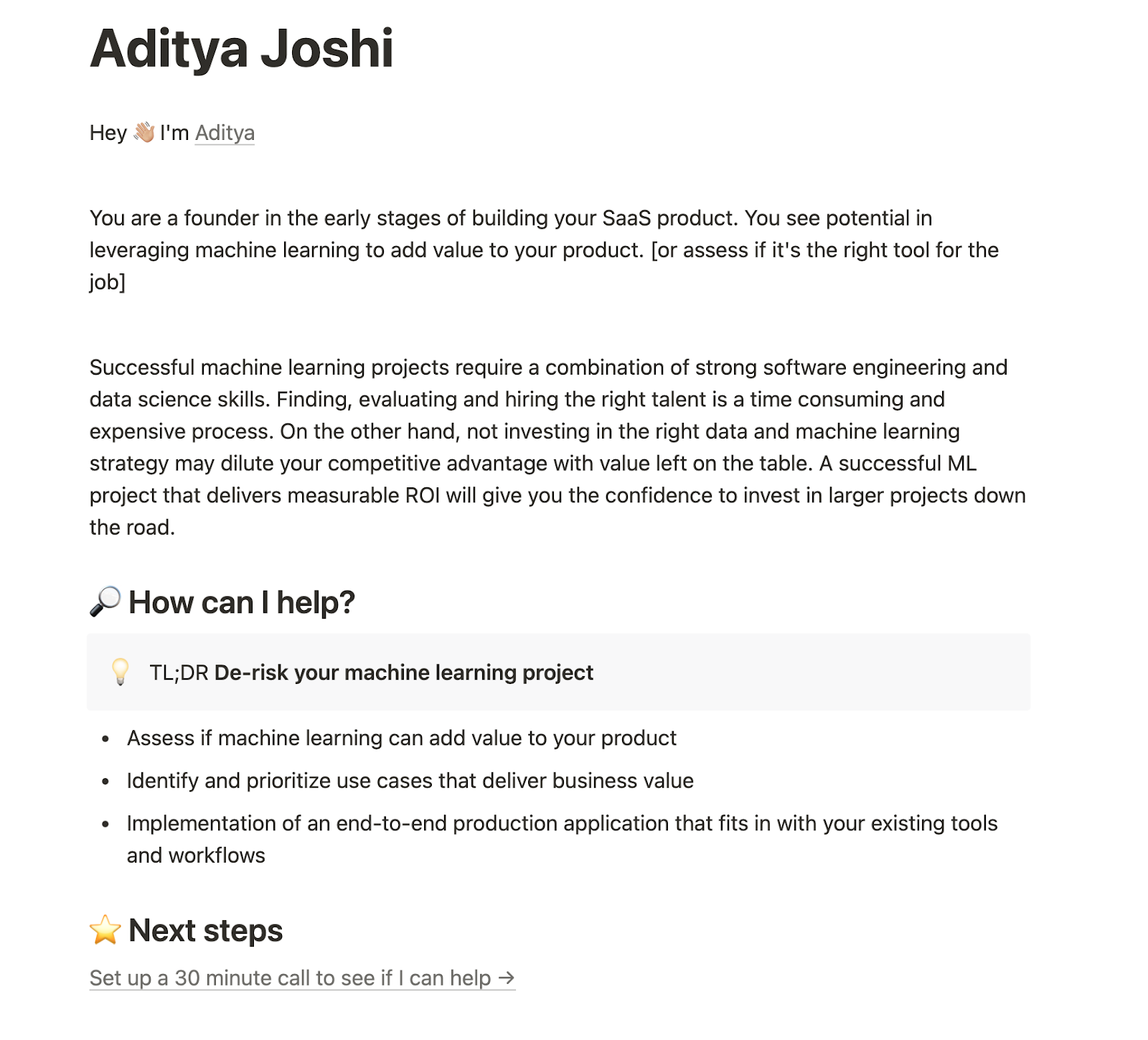
When a startup opportunity does come up, I share it within my trusted network so that we can assess the opportunity together. Oftentimes, I will pass off the opportunity to someone else if it isn’t the right fit for my technical background, or if I don’t have capacity to take it on. This is another example of how “On Deck-Adjacent” opportunities arise.
What if you don’t have an existing network?
If you don’t have an existing network, you can either join one or start building one. Joining a network like the On Deck Founder Fellowship is the quickest way to have access to high quality co-founders, whether it be directly through On Deck, or the 2nd order of “On Deck-Adjacent” talent as Melissa puts it. If you prefer building a network yourself, you’ll have to find unique ways of meeting potential co-founders by, for example, attending hackathons or conferences like Startupfest.
Evaluating your Co-founder Candidates
Now that you’ve signaled to your network that you are interested in meeting potential co-founders and are interested in startups, you need the tools to assess opportunities that you are presented with (inbound) or that you are interested in (outbound).
First impressions and clear communication count
When I first met with Melissa, she did an excellent job of selling herself as a strong leader.
She did this by talking about her past experiences, as well as selling the company’s current state and letting me know the future plans. I took note as she led these conversations with passion and excitement. Moreover she was able to very clearly communicate the business model and funding strategy. I felt confident that she could take care of all the things that a CTO doesn’t regularly do: fundraising, sales, customer success, HR, recruiting, financial management and reporting, investor management, and more. I knew that if I joined, I could concentrate on the technical side and the rest would be taken care of.
Moreover, she presented a very compelling use case on the technical side that I knew I could help with given my background in NLP. With access to a sizable dataset and an already established network of data annotators, it was a machine learning engineering’s dream!
Vulnerability and honesty go a long way
You can’t expect things in a start-up to go smoothly all the time. I’m often weary of people that brag about how everything is going great; every sales call went amazing, but somehow deals aren’t closing (?!), etc., so when Melissa opened up about the downs (as much as the ups), it was a positive sign. This will be your future partner and they will eventually find out anyway.
Evaluating the Startup
If you’re thinking of joining an already existing startup like I did, assessing the existing tech team through 1:1s and a trial run are great ways to evaluate the startup.
Assessing the existing Tech Team
Melissa founded skritswap in 2018, so there was an existing tech team. She quickly set me up with 1:1s with the tech team which I found very useful in assessing the team’s technical chops (which are incredible by the way!). I also assessed the team’s communication style and willingness to accept me as a leader. If your co-founder candidate hasn't presented this option, ask them to. 1:1s are incredibly useful in assessing what life would be like day-to-day with your team.
Lower friction with a trial first
Agreeing to start on a trial basis is a great way to lower friction for everyone. I was really excited to work with Melissa and the team, and wanted to jump straight in. Melissa presented me with a 2-month contractor agreement with flexibility on how much time I would spend during the trial since I was still in grad school. Getting a contractor agreement and NDA signed is much faster than an employment agreement/options contract.
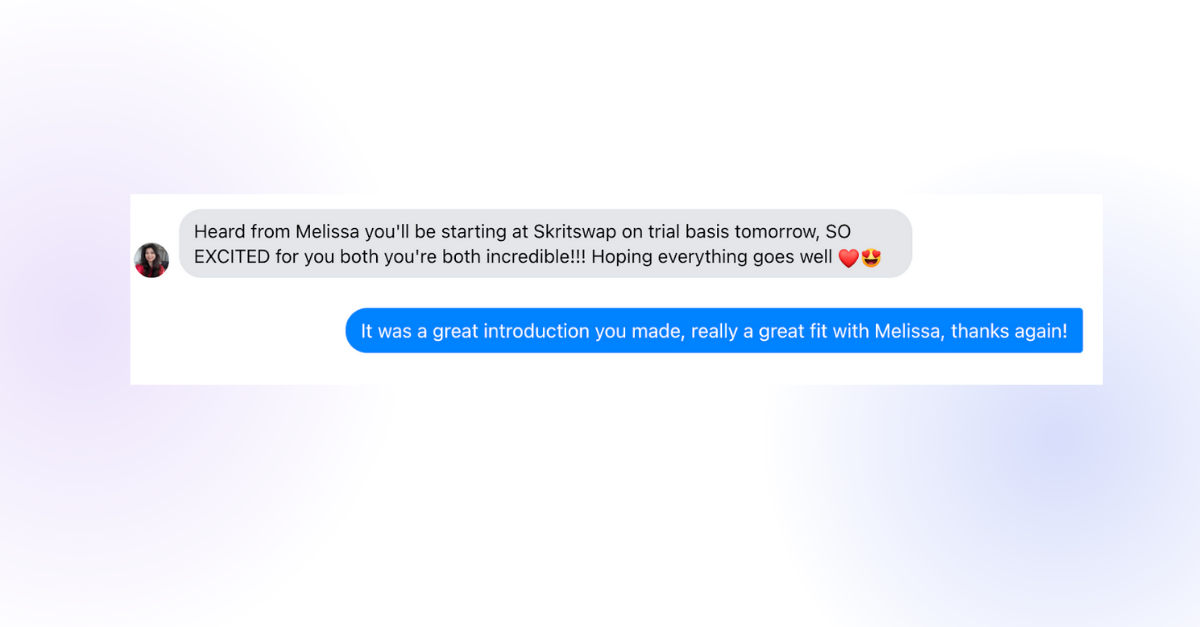
As I entered into the 2-month CTO trial phase, I kept track of my progress on a weekly basis by answering the following questions with a simple “yes” or “no”, drawing from the experiences from the previous week:
- In the time that you’ve spent with the co-founder, do your core values align? i.e. integrity, work ethic, communication style, etc.
- If you’ve entered into a disagreement with the co-founder and existing team (if applicable), do you feel like you could experience that again?
- Is the co-founder and existing team (if applicable) open to my suggestions?
- Does the co-founder and existing team (if applicable) exude high energy or passion?
- Can you picture yourself working on this business use case with the cofounder and existing team (if applicable) for a while?
- Does the co-founder and existing team (if applicable) place trust in your technical expertise?
- Does the co-founder and existing team (if applicable) believe and act in a way where “strong opinions loosely held” can be implemented?
The trial phase had simultaneous goals: evaluate Melissa and the team using the questions above, prove my worth quickly, and also assess how it would be working with the tech team. I also wanted some evidence that would back up my impressions of the tech team I established during our 1:1s.
From a technical perspective, I was able to ramp up in a couple of weeks because the code base was clear enough that I understood how things were working at a high level (praise automatic documentation!). Skritswap's lead engineer helped me quickly piece together my mental model of the current technology, and gave me constructive feedback of my future plans for the technology.
At the end of the two month trial period, I looked back on my weekly reflections (see example below - these are fictional data points due to confidentiality reasons). Since I had an overwhelming number of yeses, I decided to move forward to more formal compensation conversations. If there were a significant amount of noes, I wouldn’t have moved forward with Melissa and the team.

Compensation conversation
Once the trial period was over, we talked about equity and compensation. We discussed options that had different ratios of salary/equity, and I was willing to take more equity in exchange for a slightly lower salary, making sure that the monthly income offered was enough to support a lifestyle that I’m comfortable living with. If Melissa hadn’t offered significant equity, I would have personally taken it as a red flag.
When a potential co-founder of an existing early-stage startup doesn’t offer significant equity, it can sometimes signal that they don’t see your impact as crucial to the startup. Melissa was also transparent about the fully-diluted cap table and money raised/spent, which I saw as a positive sign.
She made up for the slightly lower salary by investing in my personal development. For example, she procured a speech coach for me to perfect my pitch (shoutout to Barry!) and referred me to the On Deck Founder Fellowship, which she paid for once I got accepted.
While the salary, equity, and the latest Macbook Pro are tangible things that I appreciate, I was more interested in how I would be invested in as a person. Encouraging me to spend 10 weeks of my time (albeit not full-time) at On Deck where I could get poached or wander off to something else was a sign of confidence and strength. It made me want to stay even closer.
Melissa and Carolyne’s Shared Playbook: Sealing the Deal with Honesty
When it became clear that Melissa and Carolyne had evaluated each other for co-founder fit, they dove into the minutia with honesty.
Carolyne was clear about entering the start-up as a co-founder, as well as a CTO. Melissa was clear about salary expectations and company growth trajectory. Crossing the t’s and dotting the i’s of final paperwork requires absolute alignment and transparency.
Melissa and Carolyne are not just lucky to have found each other, they worked hard with their own respective processes to make it happen.
Technical talent is often a key resource in the growth of a startup. Finding the right CTO involves both identifying the right person to lead your engineering team and product design and prying them away from other more lucrative options. We hope that this playbook has given you insights from both sides of that equation on how to attract and evaluate the right match for leadership at an early-stage startup.

Note: This is part of a series where we talk to On Deck Founders alumni about the companies they’re building and what it will take to propel them to the next level. Consider joining our incredible community of founders who have launched over 1000 companies worth over $9B. Apply here.














